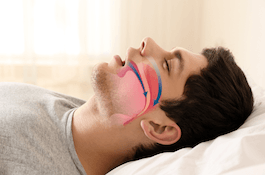Sleep Apnea Therapy Buckhead Atlanta, GA
 A good night’s sleep is essential to every aspect of your daily life. From getting through your work day to regenerating damaged cells, deep, restful sleep is necessary to keep you going. For those patients struggling with sleep apnea, waking feeling rested and ready to face the day may seem like little more than a pleasant dream. While a trip to the dentist may not be the first thing to cross your mind when you’re considering sleep apnea therapy, dentists trained in the treatment of obstructive sleep apnea can offer effective therapy to help patients stop snoring or start sleeping soundly and breathing deeply through the night. If you want to learn more about Buckhead Atlanta dental sleep apnea therapies, call the dentistry practice of Jane C. Puskas, DMD. We’ll assess your situation and help you determine whether or not you are struggling with sleep apnea.
A good night’s sleep is essential to every aspect of your daily life. From getting through your work day to regenerating damaged cells, deep, restful sleep is necessary to keep you going. For those patients struggling with sleep apnea, waking feeling rested and ready to face the day may seem like little more than a pleasant dream. While a trip to the dentist may not be the first thing to cross your mind when you’re considering sleep apnea therapy, dentists trained in the treatment of obstructive sleep apnea can offer effective therapy to help patients stop snoring or start sleeping soundly and breathing deeply through the night. If you want to learn more about Buckhead Atlanta dental sleep apnea therapies, call the dentistry practice of Jane C. Puskas, DMD. We’ll assess your situation and help you determine whether or not you are struggling with sleep apnea.
What is Sleep Apnea?
 Sleep apnea is a disorder that causes patients to stop breathing for ten or more seconds at a time during sleep. There are two forms of sleep apnea. Central sleep apnea occurs when the brain fails to trigger the body to breathe in and out during sleep Obstructive sleep apnea, as the name suggests, occurs when the airway is physically blocked during sleep. Central sleep apnea is rare, but treatment for this disorder may require a number of advanced treatments, including surgical intervention. We don’t offer therapies that address this advanced disorder, but we can help you find the right sleep physician to meet your needs. Our team does provide treatment for the more common obstructive sleep apnea.
Sleep apnea is a disorder that causes patients to stop breathing for ten or more seconds at a time during sleep. There are two forms of sleep apnea. Central sleep apnea occurs when the brain fails to trigger the body to breathe in and out during sleep Obstructive sleep apnea, as the name suggests, occurs when the airway is physically blocked during sleep. Central sleep apnea is rare, but treatment for this disorder may require a number of advanced treatments, including surgical intervention. We don’t offer therapies that address this advanced disorder, but we can help you find the right sleep physician to meet your needs. Our team does provide treatment for the more common obstructive sleep apnea.
Do I Have Sleep Apnea?
The only way to know for sure that you are suffering from sleep apnea is to undergo a sleep study. These tests can be completed at home or in a sleep clinic. We’ll recommend a sleep study for patients experiencing any of the following warning signs of sleep apnea:
- Loud chronic snoring
- Waking gasping or panting for air
- Morning headaches
- Waking feeling exhausted
- Difficulty concentrating
- Loss of memory or inability to remember details
Why Should I Visit a Dentist for Sleep Apnea Treatment?
 Dentists have advanced training in the way that oral and facial structures interact. This makes them the ideal practitioners to provide treatments for sleep apnea sufferers. Our dentists have training and experience that allow them to offer patients effective dental care.
Dentists have advanced training in the way that oral and facial structures interact. This makes them the ideal practitioners to provide treatments for sleep apnea sufferers. Our dentists have training and experience that allow them to offer patients effective dental care.
How Is Sleep Apnea Treated?
 Traditionally, sleep apnea is treated using continuous positive airway pressure (CPAP), but for those patients who don’t receive adequate treatment using this option, custom crafted oral appliances from our team may be a better option. These appliances shift the jaw forward, place pressure on the throat muscles, and keep the airway clear throughout the night. This treatment option is ideal for patients who can’t adjust to treatment using CPAP. They are comfortable, quiet, and effective. For some patients, combining CPAP and oral appliances improves the efficacy of both treatments.
Traditionally, sleep apnea is treated using continuous positive airway pressure (CPAP), but for those patients who don’t receive adequate treatment using this option, custom crafted oral appliances from our team may be a better option. These appliances shift the jaw forward, place pressure on the throat muscles, and keep the airway clear throughout the night. This treatment option is ideal for patients who can’t adjust to treatment using CPAP. They are comfortable, quiet, and effective. For some patients, combining CPAP and oral appliances improves the efficacy of both treatments.
Sleep Apnea FAQs
Why Should I See a Dentist for Sleep Apnea Treatment?
While at first the connection may not seem clear, your dentist is an expert in the upper respiratory area, making her an excellent person to provide sleep apnea treatment.
With obstructive sleep apnea (OSA) tissues from your mouth and neck can prevent healthy breathing. Dr. Puskas can help reposition the lower jaw to keep these issues out of your airway.
Plus, because you already visit Dr. Puskas regularly for your dental check-ups, you already have a built-in appointment where you can discuss your sleep disorder with her.
Does Everyone Who Snores Have Sleep Apnea?
No, not everyone who snores has sleep apnea, and not everyone who has sleep apnea snores. Only a sleep study or test can diagnose sleep apnea, which affects an estimated 20 million American adults (approximately 20% percent of the population!).
How Long Are Apnea Events or Episodes?
Most sleep apnea events or episodes last at least ten seconds but could continue for up to two minutes. They can also occur five to 30 times each hour of sleep.
A sleep test will reveal how advanced your sleep apnea is, what type of sleep apnea you have, and how often your episodes truly occur.
Zero to 15 apnea events per hour is considered mild, while 30 times or more per hour is considered severe.
Can I Diagnose Sleep Apnea on My Own?
Just because you have symptoms of sleep apnea does not mean you truly have sleep apnea. An official diagnosis is important to have before you can begin treatment for this condition.
Apple watches, Fitbits and other technology may help alert you to a potential problem; however, they don’t comprehensively test for sleep apnea. Only a sleep test can do this. Thus, to have an accurate diagnosis, you will need to have a sleep test conducted by a trained sleep doctor.

